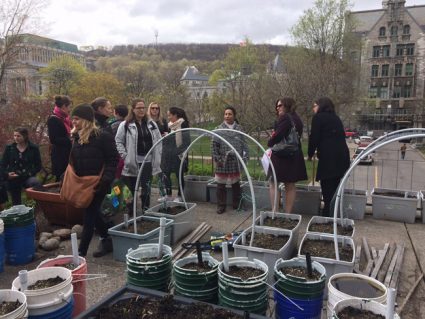 Staff Community Garden Project and Sustainable Workplace Certification green up McGill
Staff Community Garden Project and Sustainable Workplace Certification green up McGill
By McGill Reporter Staff
Recently, the McGill Office of Sustainability brought together some 50 staff members to get outside and garden together as part of the Staff Community Garden project. Organizers want to give McGill staff a new way to connect, learn about gardening, and get engaged in other sustainability initiatives around campus.
Shona Watt, Sustainability Progams Coordinator of the McGill Office of Sustainability (MOOS) said she was encouraged to see so many people turn out over their lunch break to garden. “Summer is approaching and I think we’re all excited to get our hands in the soil! I’m happy to see that so many units are interested in having bins,” she said. “It can work really well if you plant high yield crops that tend to work well: cherry tomatoes, kale, herbs, arugula, beans, peas, ground cherries, lettuce, climbing cucumbers, etc.”
Edible Campus
The staff gardens are located in the space shared with Edible Campus, which was started in 2007 by Alternatives, Santropol Roulant, and the Minimum Cost Housing Group of McGill’s School of Architecture. Edible Campus is a great example of how plantings can be woven into under-used urban spaces without getting in the way. The project received funding in two phases from the Sustainability Projects Fund to purchase containers, plants, and hold educational workshops.
Santropol relies on a team of dedicated volunteers to take care of the gardens to the east of Burnside. Midnight Kitchen, the collective on campus which gives away vegan meals, also has a section of the garden to use for its meal preparation.
Last year, Santropol invited community groups to garden a section around Burnside. The Office of Sustainability had some bins of its own, and their staff found that it was a great experience.
“Most people in Montreal don’t have a backyard or balcony to grow their own food, and it can be difficult to find healthy soil in the city. Container gardens can be easily made using recycled and durable materials, and are more portable and convenient than those in the ground. Once people get into gardening, they often see the many benefits: breathing fresh air, observing nature, and the delight of eating something you grew with your own hands.” says Watt.
Some produce from the container gardens may need to be prepared or cooked, but much of it can be plucked and eaten on the spot. Staff can share with their colleagues or donate it to local community organizations. The Office of Sustainability will organize reoccurring “lunch and learns” to share our knowledge of gardening, as well as potlucks to share the harvest.
Greening McGill’s offices
MOOS will also be rolling out a Sustainable Workplace Certification program, Sustainable Events Certification, and a staff network to share project ideas and resources.
The Sustainable Workplace Certification recognizes offices that take concrete steps toward eco-friendly and socially responsible actions. For each of the four levels of the certification, the office will receive a seal of completion as well as ideas on implementing best practices. This program gives staff the tools to make positive changes at work.
MOOS is also starting a Staff Sustainability Network to connect people across McGill to share stories, ideas, and resources of what works in their office. For those who organize events, this fall we are launching the McGill Sustainable Events certification. Event organizers will be able meet with student sustainability consultants to incorporate actions to reduce waste, purchase more ecological materials, increase physical accessibility, and encourage inclusivity. Events can be certified by McGill Sustainable Events based on the level they attain.
For more information and to learn how you can get involved in staff sustainability initiatives, contact Shona Watt at shona.watt@mcgill.ca.

I’ve seen this used before when I went to Brussels for a symposium.
The Free University of Brussels made a green spot instead of a building, and planted a vegetable garden.
I’m so glad the new turn our universities and our urbanists are taking.
Greening roofs, places, is the good way to enhance our citizen lifestyle.